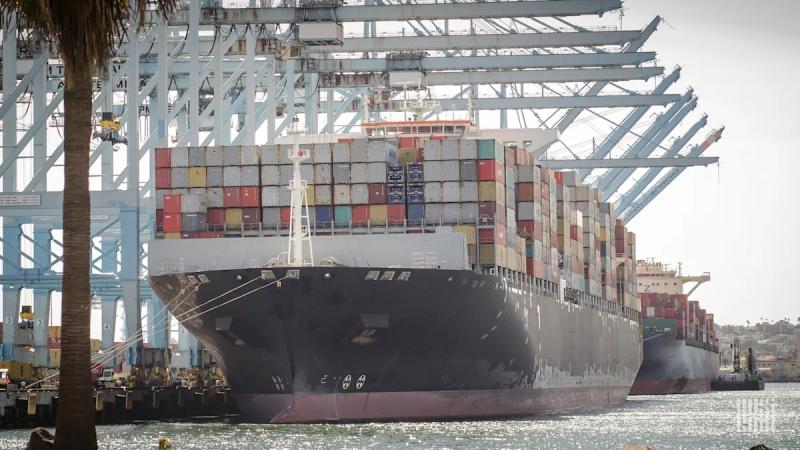'No way' US can recoup lost China container imports
By: Stuart Chirls (Freightwaves viaYahoo Finance)


It's not often the unbiased liberal press allows real information to leak into the reporting. As the data shows, the United States is importing boatloads of cheap, disposable, plastic consumer products from China -- made with fossil fuels. China gets the profits from these transactions and the United States is stuck with mountains of plastic trash. Fortunately EPA doesn't regulate trash nearly as strictly as industrial waste. Yes, boys and girls, EPA has been deliberately subsidizing Chinese trade goods with lax environmental regulation. With friends like that, in our own government, we really don't need enemies. Too bad we can't negotiate a return of all this consumer trash to its point of origin -- China.
Another glaring miscue by the unbiased press is the hair-on-fire claim that the loss of Chinese shipping containers at American ports can't be recouped. But this article specifically points out there is a mad scramble to shift supply chains to Vietnam, Thailand, India, Malaysia and Indonesia, among other countries. Do these alternate suppliers have some magic way of avoiding sending shipping containers to US ports? That seems unlikely.

While the China trade embargo instigated by President Donald Trump's tariff war has focused on the evolving collapse of eastbound trans-Pacific container volumes to the United States, a closer look at the intersection of China's share of tonnage and specific goods moving through U.S. ports paints an even more devastating picture.
According to Census Bureau data, the list of American ports that processed the most containerized imports from China in 2024 was led by Los Angeles, at 22,237,485 million metric tons, or 51%, of the port's total 43,912,894 tons of global cargo. China accounted for 8,341,200 tons, or 61%, of a total 13,592,209 tons through the neighboring Port of Long Beach, the second-highest total. Newark, New Jersey, was third and the leading East Coast gateway at 7,520,488 tons, a 23% share, of a total 32,995,507 tons.
China's share among other major container ports was 47% through Tacoma, Washington, 37% through Oakland, California, 36% through Seattle, 21% through Charleston, South Carolina and 18% through Norfolk-Newport News, Virginia.

(Chart: Jason Miller/LinkedIn)
The scope of China's share of all tonnage by commodity, according to the U.S. Harmonized Tariff Schedule (HTS), shows its dominance across top import categories. China's share, ranked in descending tonnage, is topped by items made of plastic including toys, household goods and personal care items, 46%; residential and office furniture, 46%; nuclear reactors, 41%; electronics ranging from big screen TVs to electric blankets, 40%; iron and steel goods, 47%; and toys and sports equipment, 88%.
Import categories of lesser tonnage but still China-dominant include bedsheets and pillowcases, 61%; tractors, motorcycles and bicycles, 40%; and printer and writing paper as well as paperboard for packaging, 24%.
Companies are rushing to shift sourcing to Vietnam, Thailand, India, Malaysia and Indonesia, among other countries, before Trump's 90-day pause on reciprocal tariffs ends, said Jason Miller, who teaches supply chain at Michigan State University's Eli Broad College of Business, in a LinkedIn post.
"No way we can make up for the 30-60% lost volumes from China [via other countries] due to the tariffs," said Miller. "This bodes quite ill for local employment around the most affected ports, as fewer imports equal fewer drayage drivers and warehouse workers, coupled with knock-on effects from less activity in general (e.g., local restaurants seeing less business).
"Unless the 145% China tariffs are dropped very soon (e.g., this week), I don't see how this scenario is avoided."'
There have been mixed signals out of China, with some U.S.-based logistics executives on the ground there indicating Walmart and Target have given factories the go-ahead to resume production, though the companies haven't resumed inspections prior to shipping. This would seem to indicate that the retailers are refilling the order pipeline following reports of their visits to the White House, and Trump's public statements after that the China tariffs would be coming down. But there was uncertainty over whether Trump would carve out tariff exceptions just for the mega-retailers, or whether reductions would apply to all importers.






The progressive left demands that our God given right to throw money in landfills be protected and preserved. US consumers have a right to all the plastic bubble packaging, plastic bottles, and cheap plastic products they desire. Denying consumers the right to fill landfills in rural locations is undemocratic.
After all, there is no way on God's green earth that Americans can use fossil fuels and automated injection molding machines to produce these products. The handful of needed workers costs too much and EPA will regulate the factory out of business. Where the hell would we be without China?